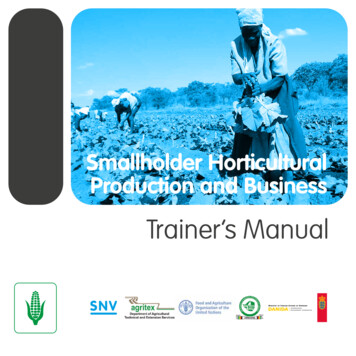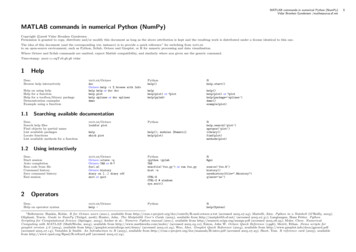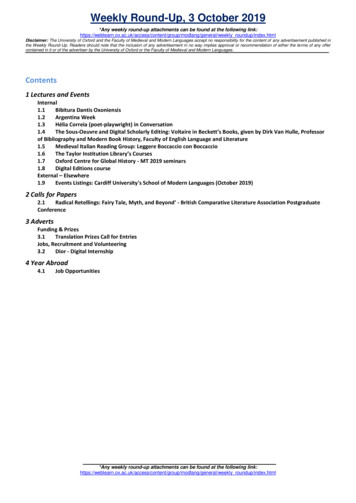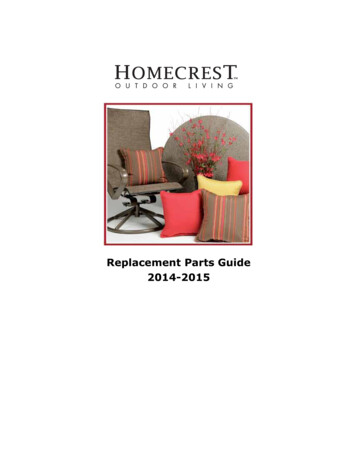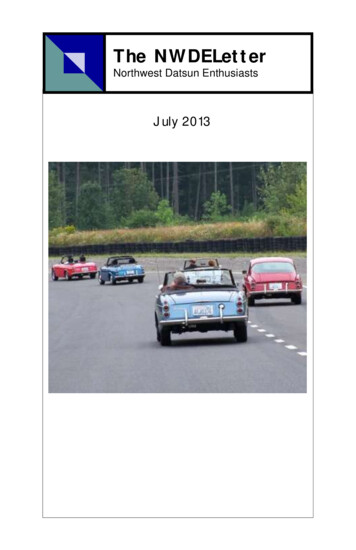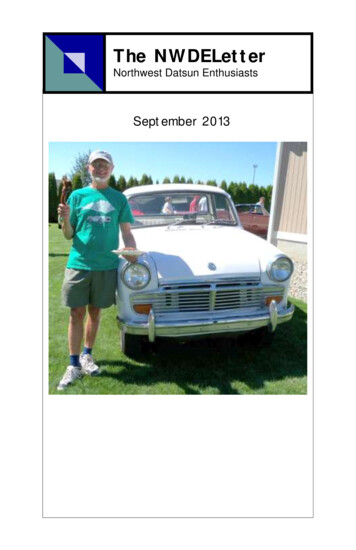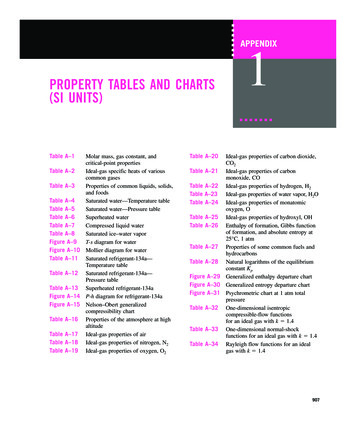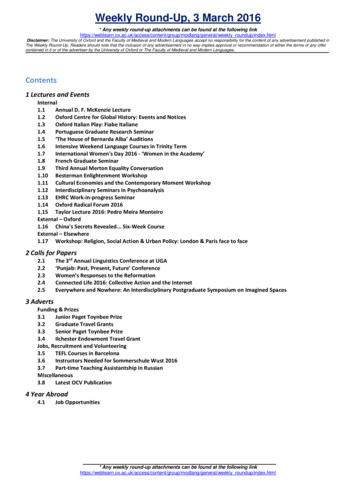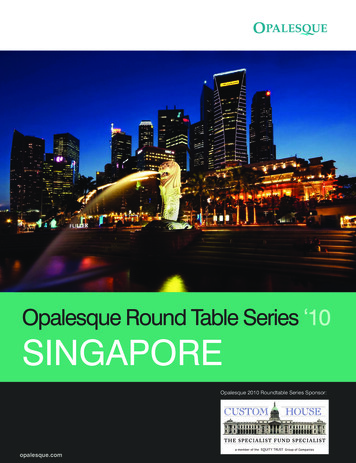
Transcription
Opalesque Round Table SeriesSINGAPOREOpalesque 2010 Roundtable Series Sponsor:opalesque.com
Editors’ NoteDear Reader,Welcome to 2010 Opalesque Singapore Roundtable, part of our Opalesque Roundtable Series which offers ongoing updates and intelligenceon the hedge fund industry.Singapore is the second destination choice for hedge funds after Hong Kong. Start-ups are reportedly on the rise this year, especially after thecentral bank approved new rules exempting most funds from obtaining a Capital Market Services licence.According to the Monetary Authority of Singapore (MAS), the Singapore hedge fund industry has weathered the crisis reasonably well in2009 despite the general downward trend globally. Notwithstanding the year-on-year decline in the number of hedge fund managers from350 to 320 as at end-2009, the AuM of the Singapore hedge fund industry held steady at S 59 billion (approximately US 42 billion) as atend-2009. The profiles of hedge fund managers and their strategies remained highly varied. This diversification has helped to sustain theindustry during the difficult period.The island country, already a key financial centre, is noticeably making sure that it stays that way through friendly regulations, ongoingtraining, good infrastructure, and, apparently, frequent airplane flights.The roundtable participants discussed the opportunities that can be found in the region, their outlooks, and focused especially on risks andrisk management.This Roundtable covers: What the region offer in terms of opportunities The role of commodities in the Asian markets and in portfolios The outlook for Asia and for various strategies The risks and challenges in the market How are the risks managed? Is VaR an effective risk management tool? What due diligence should really be about Various ways to evaluate a manager Why would one want to set up a hedge fund in Singapore?The Singapore Roundtable took place on September 21st, 2010, at the local offices of Custom House and included the following experts: Mark Wightman, SunGard (Asia-Pacific) Adam Fiore, Chief Operating Officer, Flowering Tree Investment Management Randall Kahn, Director of Investments, APS Investment Management Dermot Butler, Chairman, Custom House Group Benedict Yap, Senior Researcher, Mercer Investment Consulting (Singapore) Lionel Semonin, Managing Dire ctor, Four Elements Capital Stephane Pizzo, Managing Partner, Lotus Peak Capital Lampros Vassiliou, Managing Partner, Teak Capital PartnersWe thank our 2010 Roundtable Series sponsors Custom House Group and Taussig Capital, as well as SunGard, our Singapore Roundtablesponsor, for their support.Enjoy "listening in" to the 2010 Opalesque Singapore Roundtable!Benedicte GravrandSenior News Editor - Opalesque Ltd.gravrand@opalesque.comCover Photo: Merlion, Singapore2OPALESQUE ROUND TABLE SERIES 2010 SINGAPORE
Participant Profiles(LEFT TO RIGHT)Standing: Benedict Yap, Dermot Butler, Ralph Chicktong, Mark Wightman, Stephane Pizzo, Lionel Semonin, Benedicte GravrandSeated: Randall Kahn, Lampros Vassiliou, Adam FioreOpalesque Singapore Roundtable Sponsor3OPALESQUE ROUND TABLE SERIES 2010 SINGAPORE
IntroductionMark WightmanSunGardAdam FioreFlowering Tree InvestmentManagementRandall KahnAPS Investment ManagementDermot ButlerCustom House GroupI look after the strategy for SunGard in Asia-Pacific. I have been active in the alternatives spacefor over 15 years, and covering Asia since 1994. The role we play as a technology vendor includesproviding portfolio management and risk solutions, decision support tools, and fund accountingpackages across the whole alternative spectrum from hedge funds to private equity and fund offunds.I am the Chief Operating Officer and head of the Risk Management Committee for Flowering TreeInvestment Management based in Singapore. We are an Asia ex-Japan equities hedge fundmanager that launched our investment funds in May 2009. Our primary exposures are in GreaterChina and India. Our focus is company specific, we look for structural growth stories with highreturns of capital employed on the long side and bad businesses with low returns on capital andspecific catalysts on the short side. We do not have a macro overlay, but, rather, have a riskmanagement plan to deal with the significant downward volatility that occurs from time to time inour markets.I am the Director of Investments at APS Investment Management, among the first Singaporeinvestment firms focused on Asia. We have 15 years of experience, 1.9 billion of assets andseveral offices in the region: the head-quarters are in Singapore, we have three offices in China(Beijing, Shenzhen and Shanghai) and one in Tokyo. Our three core products are managed by theAsia, China and Japan teams. Performance has been Best in Class and we have won several awardsin the last couple of years. We do both long-only and long-short, and we are bottom-upfundamental, long-term investors with low turnover. Our Asia-Pacific hedge fund is up over 25%year-to-date net and the Greater China long-short is up about 14% net.I am the Chairman of the Custom House Group. We are a global fund administrator. The headoffice is in Malta and the subsidiary companies in Dublin, Chicago, Singapore, Luxembourg,Netherlands, and Guernsey, which hosts half a person. We specialize in alternative investmentacross the range of CTAs, hedge funds, funds of funds, including sub-funds, managed accounts,managed account platforms.We have also won a couple of awards. We have two separate awards for Best Client Service. Andwe also had one about 18 months ago for Best Small Hedge Fund Administrator. And I queryjournalists’ punctuation as to whether that is the Best “Small Hedge Fund” Administrator or theBest “Small” Hedge Fund Administrator.” And we believe they are talking about the BestAdministrator of Small Hedge Funds.Benedict YapMercer Investment Consulting4I am a Senior Researcher with Mercer Investment Consulting in Singapore. We have been in theglobal investment consulting business for more than 35 years, and are present in more than 55locations worldwide. Our clientele is very much institutional, and includes the likes of retirementschemes, government agencies, sovereign and national funds, endowments, charities and privatebanks, amongst others. On a global basis, our assets under advisement amount to some US 3.7trillion. We are 160-strong in the Asia Pacific and we have been in Singapore since 1995. As amanager researcher, I am responsible for conducting research on traditional Asia equities andbonds managers, as well as Asian hedge fund managers. Prior to Mercer, I was a hedge fundanalyst with a Swiss-based fund-of-hedge funds.OPALESQUE ROUND TABLE SERIES 2010 SINGAPORE
Lionel SemoninFour Elements CapitalStephane PizzoLotus Peak CapitalLampros VassiliouTeak Capital Partners5I am the Managing Director at Four Elements Capital, which was founded almost 2 years ago by ateam of ex-BNP Paribas and ex-JP Morgan commodity specialists, who had been working togetherfor about 5 years. We focused on commodity and quantitative analysis and developed strategies.Four Elements is a specialized commodity asset manager focused on absolute returns from aquantitative, systematic, fundamental analysis approach. Our team of 9 members is concentratedon commodity research. We now trade 30 commodities, and are about to increase that to 35commodities. Our flagship fund, the Earth Element Fund, will be 2 years old at the end December.I am the Managing Partner of Lotus Peak Capital in Singapore. I have been a hedge fund analystsince 1994 in Switzerland, the U.S and now in Asia for the past four years. Lotus Peak Capital isactive in two main fields: we manage an Asian fund of funds, focusing on non-beta strategies. Wefocus on macro, CTAs, commodity trading, volatility trading, arbitrage, ie strategies that benefitfrom Asian volatility and market inefficiencies without having a large exposure to market beta. Inaddition,we act as a consultant for a small number of European investors who wish to access onthe ground expertise in the Asian hedge fund selection.I am the Managing Partner of Teak Capital Partners. We set up in Singapore in 2007-2008. We area specialist in special situations investments with a focus on private debt opportunities in eitherdistressed or event driven situations. Southeast Asia is our primary focus, but we have an AsiaPacific brief including Australia. We also look to structure investments, by operating on a capitalpartnership basis, where we can combine with a capital partner; we have a number of strongcapital partnerships with other investment groups and high net worth investors. We originate andstructure the investments and then look to take down a portion of the deal in conjunction with acapital partner who will take down the balance. We also provide what we call special assetmanagement services, where we assist other funds or investors extract value from their troubledinvestments.OPALESQUE ROUND TABLE SERIES 2010 SINGAPORE
Benedicte GravrandLampros VassiliouWhat is the outlook on your strategies? What are your best ideas?The outlook is strong, particularly in Australia, where there were a number of special situationopportunities, and also in Indonesia and in Thailand. Although the market for a fund like oursexists in good and bad times, there a numerous opportunities at present - the opportunities arelargely a function of the state of the global economy and tightness in credit at a particular time.The outlook tends to hop around from market to market.Our key investment approach involves providing capital to companies through a well covered debtinstrument combined with equity or other upside, at a time where the company is about to collapseor facing a major event including an inability to refinance maturing debt , rescue the companyfrom the edge of the cliff, recapitalize and restructure it both financially and operationally,positioning it for growth, and then moving forward with it, capturing follow on growthinvestment opportunities thereafter.Stephane PizzoLionel SemoninThe opportunities for fund of funds are in the opportunities of the underlying managers. Thereason we are based in Asia is because we think the region offers, from a global standpoint, thebest opportunities in terms of volatility inefficiencies and diversity in the various markets andinstruments. Obviously in this space talent is rare, so the challenge is to find the right manager forwhat we are trying to achieve. But we think Asia is probably the best region to try to extractpositive returns going forward.Our flagship product extracts fundamental discrepancy in a really systematic way, and producestransparent diversified commodity long-short portfolio. The Asia opportunity does not only residesin Palm Oil and Rubber (traded in Kuala Lumpur and in Tokyo respectively) but also inunderstanding the driving factors of commodity consumption in Asia which is becoming more andmore important in the global commodity trading landscape.Within emerging markets, one has to differentiate between net importers versus net exporters ofcommodities. In Asia, a strong fraction of the commodities are net importers and will continue tocreate further imbalances impacting prices going forward. We also believe that the commoditymarket is now in the second phase of a long term Bull Run, where price should be impacteddifferently representing increasing constraint to produce certain commodities.Lionel SemoninWithin emerging markets, one has to differentiate between net importers versus net exporters ofcommodities. In Asia, a strong fraction of the commodities are net importers and will continue tocreate further imbalances impacting prices going forward. We also believe that the commoditymarket is now in the second phase of a long term Bull Run, where price should be impacteddifferently representing increasing constraint to produce certain commodities.Four Elements Capital specializes in looking at these differences in a quantitative manner in orderto invest on those which are likely to be the most supplied constraints.Benedict YapWith our clients, we typically establish a long-term strategic allocation program for theirportfolios. On the back of this, we then seek to add value in the short term opportunistically, via adisciplined dynamic asset allocation process, which seeks to exploit deviations from long termaverages and so generate improved returns amidst reduced risks.With regard to hedge fund strategies, we started the year seeing the hedge fund universe deliver itsbest return in a decade, on the back of distressed markets normalising and technical factors6OPALESQUE ROUND TABLE SERIES 2010 SINGAPORE
correcting. Some managers have come through more strongly than others, with the overalluniverse of managers also being significantly smaller now than it was two years ago.Going forward, we don’t expect the same strength in returns as we have seen in 2009, becausemarkets have returned much closer to normal. This said, we still believe that current marketconditions do provide some attractive opportunities for active management. Hedge funds also facefar less competition, both from within their own industry and also from the investment banks.We expect the recovery in US corporate profits and the strength of the emerging eastern economiesto lead most major global markets towards recovery.However there are also some significant risks – over the short-term, we believe that the rally we’veexperienced in the third quarter thus far have resulted in certain markets running a little ahead oftheir improvements in fundamentals, and we are also concerned that smaller companies globallyare more vulnerable to hiccoughs in the recovery. While this makes us cautious about managerswith significant beta exposure, the dispersion of returns within the markets suggests that there aresome great opportunities for equity long-short managers that can add value on both the long andshort sides of their books.Trading-oriented strategies (Global Macro, Managed Futures/CTAs and commodities) had a relatively disappointingyear in 2009 following strong 2008 returns. While the last 3-6 months seem to point to a possible turning point forthese managers, we are wary that many of the headwinds that they have faced recently (including a lack of cleartrends) may continue. Until there is a clear outlook for inflation and/or the major central banks start the process ofincreasing interest rates, the main opportunities appear to be in intra-country, picking up the strengths of differenteconomies, and how these countries are dealing with them. This may favor short term strategies as well asfundamental approaches. We also believe that speculation around the role of the USD as an anchorcurrency will persist and managers who anticipate correctly changes in sentiment on that front willdo well. While we think that there will be challenges as well as opportunities for trading strategiesfor the rest of this year and going into 2011, we still believe that trading strategies have animportant role to play in a portfolio context.Interestingly a number of fund-of-hedge funds have recently started adding exposures tocommodity hedge funds. We started advocating these strategies to clients in 2008, becausethey provide an attractive alpha source that is lowly correlated to other mandates. We haverecently been implementing a number of new fund-of-commodity hedge fund mandatesfor clients.Benedict YapTrading-oriented strategies (Global Macro, Managed Futures/CTAs and commodities) had arelatively disappointing year in 2009 following strong 2008 returns. While the last 3-6 monthsseem to point to a possible turning point for these managers, we are wary that many of theheadwinds that they have faced recently (including a lack of clear trends) may continue. Untilthere is a clear outlook for inflation and/or the major central banks start the process of increasinginterest rates, the main opportunities appear to be in intra-country, picking up the strengths ofdifferent economies, and how these countries are dealing with them. This may favor short termstrategies as well as fundamental approaches. We also believe that speculation around the role ofthe USD as an anchor currency will persist and managers who anticipate correctly changes insentiment on that front will do well. While we think that there will be challenges as well asopportunities for trading strategies for the rest of this year and going into 2011, we still believethat trading strategies have an important role to play in a portfolio context.Interestingly a number of fund-of-hedge funds have recently started adding exposures tocommodity hedge funds. We started advocating these strategies to clients in 2008, because they7OPALESQUE ROUND TABLE SERIES 2010 SINGAPORE
provide an attractive alpha source that is lowly correlated to other mandates. We have recentlybeen implementing a number of new fund-of-commodity hedge fund mandates for clients.Some of the most attractive opportunities this year have been in the event-driven space. On themergers side, companies have stored up significant cash reserves over 2009, and with littleprospect of organic growth in the short-term, mergers and acquisitions have been abundant andare likely to continue increasing as companies seek to consolidate. This space is particularlyattractive now that the hedge fund industry has shrunk. The weight of assets targeting potentialdeals is also much lower than it has been for a number of years, as hedge fund assets alone in thisspace are back to 2005 levels, which is almost half their peak at the end of 2007; deal spreads arewide, which in turn provides good opportunities for returns. On the distressed side, while thecompression in credit spreads has reduced some of the beta opportunities, we still believe that thereare good security specific opportunities available in the markets.The broad range of opportunities that we saw in the relative value space at the start of 2009 hasnarrowed significantly, with some managers making strong gains through last year. Convertiblebond arbitrage managers have clearly rebounded strongly and opportunities going forward appearto be more security specific. Volatility arbitrage managers suffered last year with the significantdecline in expected volatility but a number of fund-of-hedge fund managers we rate highly areonce again seeing small allocations to such managers as a good insurance premium given thepotential risks through the next 6-12 months.Overall we believe that hedge funds in aggregate should deliver strong returns in the short-mediumterm, but we caution that investors should not expect the same strength that we have seen in 2009.Dermot ButlerWe are administrators, so we look at where the market is in the funds or accounts which we canprovide our services to. We have seen some huge disruptions: 100 million three years ago waspetty cash, but today it is an ambitious target for a startup manager.The likelihood that a company like Custom House managing to get one of the 5, 10, 15 billionaccounts today is slim. We think we can increase that opportunity by boosting our services. Forexample, real time pricing is necessary.As far as the actual targets, today's fashionable move is the UCITS funds. There is an awful lot oftalk about UCITS and I think it is probably a lot of wasted air; people are going to buy UCITS forthe wrong reason; they believe that because they are regulated and therefore safe. However, fourUCITS funds in Europe went under because they were invested in Madoff. Regulation isn't going tostop a crook. It is also dangerous because some investors are liable to tick the due diligence boxbecause UCITS funds are regulated. UCITS does nothing to preclude an incompetent manager, sodue diligence is still incredibly important.Many hedge fund strategies just cannot use the UCITS format; or they may have to go throughsome rather complex form of derivative structure in order to get the long-short aspect, which isexpensive and adds complexity. The anecdotal evidence of the number of UCITS funds that startedand got nowhere is quite strong.If a big name manager or an institution comes along and says “I only invest in UCITS, but I likeyour strategy, so I'll give you a 100 million if you add UCITS,” then you would be a fool not toopen a UCITS fund. But the average manager must heed the cost, has got to explain why theirUCITS fund is under-performing their Cayman fund, and must find some form of distribution.And I have this image of the poster of Ben-Hur, the movie, which had “Ben” going up with a smallb and a bigger E and a very big N and then the “Hur” having a big H, small U and a very small Rat the bottom, and Charlton Heston in the chariot. It is exactly the same poster for the UCITS fund.The difference is that, at the back above, is Charlton Heston wearing his other costume as Moses,holding out an arm with a tablet that says 130/30. The 130/30 fund were a huge story and I don'tknow one person who actually managed to raise much money there.8OPALESQUE ROUND TABLE SERIES 2010 SINGAPORE
So that is one of the problems of trying to identify where the market is. We are not doing much asfar as UCITS go, but we are doing a lot with managed accounts and managed account platforms.And I have this image of the poster of Ben-Hur, the movie, which had “Ben” going up with a small b and a bigger E anda very big N and then the “Hur” having a big H, small U and a very small R at the bottom, and CharltonHeston in the chariot. It is exactly the same poster for the UCITS fund. The difference is that, at theback above, is Charlton Heston wearing his other costume as Moses, holding out an arm with atablet that says 130/30. The 130/30 fund were a huge story and I don't know one person who actuallymanaged to raise much money there.So that is one of the problems of trying to identify where the market is. We are not doing much as faras UCITS go, but we are doing a lot with managed accounts and managed account platforms.Dermot ButlerAnd fund of funds; a lot of them are liable to go the managed account route because most of theinvestors we talk to now require matched liquidity; which is easier to achieve in a managedaccount. These are the strategies we are looking at.Randall KahnWe should use more of those types of cinematic allegories in finance, and your point about130/30s is well taken.At APS, we are a deep fundamental bottom-up value-bias investor. We do both long and longshort. Our hallmark is primary research, and we don't rely upon street research. We like to becontrarian; we got out of the market in 2007, which helped us in 2008, and we got back into themarket and that helped us in 2009. These decisions were based on market valuations at the time.We have 11 investment staff in China, 15 in Singapore, 4 in Japan.We also use third party consultants; when you invest in Asia, it is like getting married, you mustknow who you are going to be spending your life with. So, we do background checks onmanagement. For example, the market was really excited about a food company that was thecaterer for the Olympics in China. They raised a lot of money for capital expenditures (capex) andstate-of-the-art production facility. So we went out and visited it in China and found that theequipment was old and second class; the money was not being used. The company later wentbankrupt when it was discovered that the head of the company used the money for his ownpersonal expenditures.There are opportunities to be found in Asia; it's just not efficient, and we find that to be awonderful stomping ground.We have seen a lot of analysts on the Street who have migrated to the hedge fund world, so thequality of research has degraded; that means that our own research is that much more value added.We also find that there is definitely a lot of group-think in Asia; so when people are zigging, welike to zag; we want to see what is different from the market consensus.And then there are 1800 companies listed in China, of which 400 to 500 have research from thestreet; that means that there are a lot of great companies where you can generate alpha; we havepeople on the ground kicking the tires, speaking, reading, writing Chinese, talking to management,reading the local press, chatting with the locals in the region. This is our kind of market.As for our best idea; Melfas is a Korean make of chip modules used for touch panels, for the likesof Samsung and LG’s touch panel phones. It is interesting because the market is booming;Samsung and LG are expanding their product offerings and, with only four players, there is anoligopoly.9OPALESQUE ROUND TABLE SERIES 2010 SINGAPORE
There are opportunities to be found in Asia; it's just not efficient, and we find that to be a wonderful stomping ground.We have seen a lot of analysts on the Street who have migrated to the hedge fund world, so thequality of research has degraded; that means that our own research is that much more valueadded.We also find that there is definitely a lot of group-think in Asia; so when people are zigging, welike to zag; we want to see what is different from the market consensus.And then there are 1800 companies listed in China, of which 400 to 500 have researchfrom the street; that means that there are a lot of great companies where you cangenerate alpha.Randall KahnMelfas is gaining market share because they have lower costs of production, since they use fewerlayers of film during manufacturing. They are integrated, and when 4G comes out, they will beable to bring out their product much faster than their competitors, benefiting their clients such asSamsung.Adam FioreWith regards to the market outlook, the investment team at Flowering Tree is quite excited at thecompany level; they see opportunities to invest in industry leading companies run by strongmanagement teams growing at 20-25 percent plus at reasonable prices. We like the consumertheme in China and to a degree in ASEAN. The financial and industrial sectors provideopportunities both on the long and short sides.Like Randall, we think the way to make money is to be independent and right and ahead of theStreet or contrary to the Street. Each of our 5 senior investment team members focuses on alimited number of companies both long and short that they know well, only about 40 to 50companies. We think our focus helps us get an edge in understanding the direction and inflectionsin companies’ fundamentals before they are apparent to others and develop the higher convictionlevels needed to ride winners.Mark WightmanAt SunGard, we are most interested in terms of what strategies clients want to run right now. Startups in Asia have traditionally been long-short strategies but a lot of startups at the moment arelooking at global macro and other liquid strategies, and there are definitely a number of playerseither specializing in FX or in interest rates.Start ups in Asia have traditionally been long-short strategies but a lot of startups at themoment are looking at global macro and other liquid strategies, and there are definitely anumber of players either specializing in FX or in interest rates.There are a couple of very interesting startups that will be coming out of prop desks in thenext six months, which ties in with what is happening in the U.S., where a lot of prop desks arebeing spun off. Also echoing Dermot's point about due diligence, we all know it is taking longerfor the startups to raise money, and investors are increasingly looking for an institutionalsystems infrastructure; the days of 2 men and a spreadsheet are gone.Mark WightmanThere are a couple of very interesting startups that will be coming out of prop desks in the next sixmonths, which ties in with what is happening in the U.S., where a lot of prop desks are being spun10OPALESQUE ROUND TABLE SERIES 2010 SINGAPORE
off. Also echoing Dermot's point about due diligence, we all know it is taking longer for thestartups to raise money, and investors are increasingly looking for an institutional systemsinfrastructure; the days of 2 men and a spreadsheet are gone.There is no doubt that technology is definitely part of the due diligence process now. One area Iwould flag which some of the prime brokers have picked up on is that it has almost got the pointthat it has become a box ticking exercise. Some of the funds are just looking to buy the cheapestsystem they can find, whether or not it is actually useful. I hope that investors are going to beaware of this and actually drill into it. There is no point just having something to tick a box, it hasgot to be of sufficient value and actually fit for purpose.Adam FioreGoing back to the outlook question, from an individual public company perspective it is quitepositive in many cases.But when one looks at the markets as a whole we think the challenge is that while in the mediumand certainly the long term the fundamentals are going to drive returns, in the short and mediumterm there can be significant disconnects. We spend a lot of time thinking about those issuesand are layering in, not a macro view, but risk management techniques to deal with things likethe MSCI AC Asia ex- Japan index (MXASJ) being down 50 %, which has happened threetimes in the last about 15 years.Adam FioreBut when one looks at the markets as a whole we think the challenge is that while in the mediumand certainly the long term the fundamentals are going to drive returns, in the short and mediumterm there can be significant disconnects. We spend a lot of time thinking about those issues andare layering in, not a macro view, but risk management techniques to deal with things like theMSCI AC Asia ex- Japan index (MXASJ) being down 50 %, which has happened three times in thelast about 15 years.Given this, your base case has to be that the same thing is likel
We thank our 2010 Roundtable Series sponsors Custom House Group and Taussig Capital, as well as SunGard, our Singapore Roundtable sponsor, for their support. Enjoy "listening in" to the 2010 Opalesque Singapore Roundtable! . Chicago, Singapore, Luxembourg, Netherlands, and Guernsey, which hosts half a person. We specialize in alternative .
